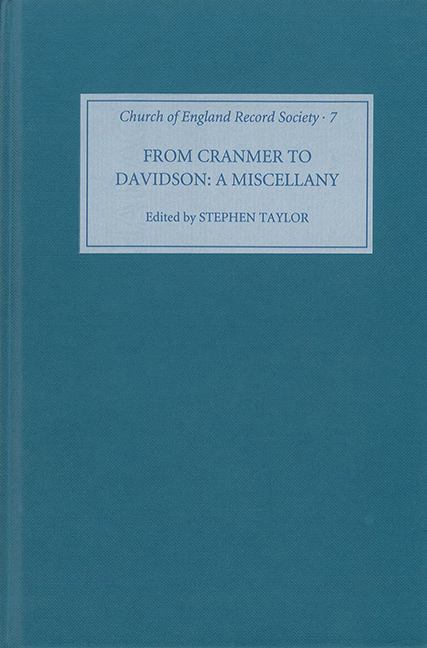Book contents
- Frontmatter
- Dedication
- Contents
- Preface
- Abbreviations
- 1 Thomas Cranmer and the Metropolitical Visitation of Canterbury Province 1533-1535
- 2 Edward Brocklesby: ‘The First Put Out of his Living for the Surplice’
- 3 Richard Montagu: ‘Concerning Recusancie of Communion with the Church of England’
- 4 Petitions for Episcopacy and the Book of Common Prayer on the Eve of the Civil war 1641-1642
- 5 Bishop Edmund Gibson's Proposals for Church Reform
- 6 Samuel Horsley: ‘Thoughts on Civil Government’
- 7 W. J. Conybeare: ‘Church Parties’
- 8 Randall Davidson: A Partial Retrospective
- Index
- Church of England Record Society: COUNCIL AND OFFICERS FOR THE YEAR 1998-99
3 - Richard Montagu: ‘Concerning Recusancie of Communion with the Church of England’
Published online by Cambridge University Press: 14 August 2020
- Frontmatter
- Dedication
- Contents
- Preface
- Abbreviations
- 1 Thomas Cranmer and the Metropolitical Visitation of Canterbury Province 1533-1535
- 2 Edward Brocklesby: ‘The First Put Out of his Living for the Surplice’
- 3 Richard Montagu: ‘Concerning Recusancie of Communion with the Church of England’
- 4 Petitions for Episcopacy and the Book of Common Prayer on the Eve of the Civil war 1641-1642
- 5 Bishop Edmund Gibson's Proposals for Church Reform
- 6 Samuel Horsley: ‘Thoughts on Civil Government’
- 7 W. J. Conybeare: ‘Church Parties’
- 8 Randall Davidson: A Partial Retrospective
- Index
- Church of England Record Society: COUNCIL AND OFFICERS FOR THE YEAR 1998-99
Summary
Introduction
Richard Montagu (1577-1641) was undoubtedly one of the most controversial divines of his day. His allegedly ‘arminian’ works the New gagg and Appello Caesarem were the casus belli for calvinist and parliamentary attacks on the so-called 'Durham House Group’ of ceremonialists, and played an important role in generating political conflict as well as acrimonious theological debate that reached a crescendo in the York House conference of 1626. His surviving letters to his friend and ally John Cosin provide a vivid and unforgettable insight into an extraordinarily polarized and divisive view of the Church of England, haunted to the point of paranoia by fears of puritans within the establishment, and sustained at times by an almost hysterical air of impending martyrdom.
Montagu's importance in the history of the Church of England is clear. But, while historians’ attention has naturally focussed on the works that caused him most notoriety in the 1620s - the New gagg and Appello Caesarem - Montagu published many other works. These are mostly bulky Latin tomes engaging in prolonged debate with the Roman Catholic scholar Cesar Baronius, and defending Isaac Casaubon against the assaults of the Catholic polemicist J. C. Bulenger. There is, however, one pithily written work in English that is in its way as controversial as Montagu's more famous writings, but which has attracted surprisingly little attention from historians. The covenanter Robert Baillie, busily amassing materials in the late 1630s for the attack on laudian heterodoxy that he launched in his Canterburian's self-conviction, noted the existence of ‘Montagu's apparatus, and a little writing for the recusants, going from hand to hand in Cambridge'. The Apparatus ad origines ecclesiasticarum was published by Montagu in 1635. The ‘little writing for the recusants', however, was never printed and drew no comment in the works of Baillie, William Prynne and others against the laudian movement, which tended to restrict themselves to published writings. At least three copies of this neglected work are known to have survived, and there seems little doubt that its author was the then bishop of Chichester, Richard Montagu. Bearing the title ‘Concerning Recusancie of Communion with the Church of England', this neglected manuscript tract offers an intriguing new insight into Montagu's thinking in the 1630s, as well as providing an important example of a significant genre of English protestant polemic.
- Type
- Chapter
- Information
- From Cranmer to DavidsonA Church of England Miscellany, pp. 69 - 102Publisher: Boydell & BrewerPrint publication year: 1999



